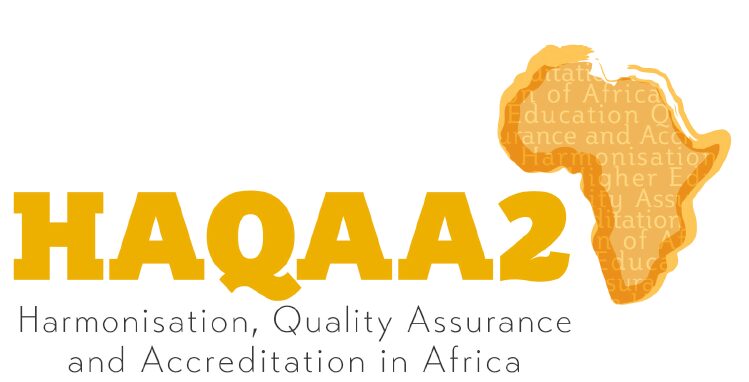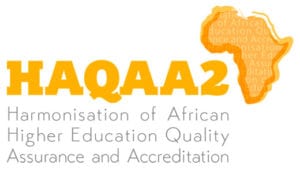This website comprises a compendium of material developed as part of the HAQAA2 training course IQA-4-Africa – From Pan-African Policy to Practice. The material collated here provides an overview of core topics of higher education and quality management from an international perspective and offers the possibility to use further material to deepen the respective topics. The six modules were developed by the Wandelwerk – Centre for Quality Assurance and Enhancement of FH Münster University of Applied Sciences in collaboration with international experts in higher education and quality management Prof. Dr. Kayode Adekeye (WAAQAN), Prof. Dr. Joseph Aka Hepkanjin (CAMES), Dr. Youhansen Eid (NAQAAE), Prof. Dr. Tashmin Khamis (EAQAN), Dr. Jeffy Mukora (CNAQ), Bella Sattar (SARUA). The six modules cover the following topics:
00
Preface and Regional Case Studies This section provides prefaces and regional case studies from the HAQAA2 consortium and partners.
Click here to go to Preface and Regional Case Studies01
Module 1: Policy Framework The module Policy Framework deals with the PAQAF – the Pan-African Quality Assurance and Accreditation Framework – and its several action lines and instruments related to the convergence of the African Higher Education sector, and more specifically quality assurance and accreditation.
Click here to go to Module 102
Module 2: Internal Quality Assurance in Higher Education Institutions The module provides a basic introduction to quality management at universities and presents various models of internal quality assurance systems.
Click here to go to Module 203
Module 3: Evaluation as an Integral Part of Quality Assurance The module introduces the basic topics of evaluation at universities. It deals with evaluation standards, operationalisation and questionnaire construction. Furthermore, it deals with the use of evaluation results.
Click here to go to Module 304
Module 4: Study Programme Development The module deals with outcome-based study programme development and provides concepts and methods as well as a series of case studies on programme development processes.
Click here to go to Module 405
Module 5: Project Management The work of quality managers often takes the form of projects. Therefore, Module 5 deals with the basics of project management in Higher Education Institutions.
Click here to go to Module 506
Module 6: Change Management The last module introduces the basics of change management. It can support university and quality managers in implementing change in their universities.
Click here to go to Module 6The material is primarily designed as self-learning material and comprises three areas per topic:
1. Cinema: Here you will find a short introductory text and a series of screencasts. The introductory text is not a complete summary of the information given in the screencasts. It can introduce you to the respective topic and help you to remember the key facts later. You can make use of the full potential of the learning material and have the most fruitful learning experience, if you watch the respective screencasts in the cinema and work on the reflective questions, which you find at the end of each introductory text.
2. Bookshelf: Further reading to deepen your knowledge (scientific discussions and studies) can be found in the bookshelf of each topic.
3. Toolbox: Material for the transfer from theory into practice, like worksheets, templates etc. are available to be adapted and used for your own work.
The material can be used free of charge for non-commercial purposes and passed on unchanged, provided the authors are named.
List of authors:
Training material development
In addition, a whole range of experts assisted in the preparation of the materials and provided case studies and material:
- Prof. Dr. Annika Boentert (Wandelwerk/FH Münster, Germany)
- Petra Pistor (Wandelwerk/FH Münster, Germany)
- Dr. Joachim Preusse (Wandelwerk/FH Münster, Germany)
- Bella Sattar (SARUA)
- Dr. Jeffy Mukora (CNAQ)
- Dr. Oliver Vettori (University of Economics and Business, WU, Austria)
- Dr. Phetolo Malau-Modiega (Botswana International University of Science and Technology, Botswana)
- Dr. Violet Makuku (AAU)
- Dr. Youhansen Eid (NAQAAE)
- Elizabeth Colluci (OBREAL)
- Lynette G. Kisaka (CUE, Kenya)
- Mave Dhed’asi Gracia (Unversité de Kisangani, RD Congo)
- Mrs. Abigail Dzama Anderson(The Kwame Nkrumah University of Science & Technology, Ghana)
- Prof. Dr. Amine Allal (University of Tlemcen, Algeria)
- Prof. Dr. Joseph Aka Hepkanjin (CAMES)
- Prof. Dr. Kayode Adekeye (WAAQAN)
- Prof. Dr. Tashmin Khamis (EAQAN)
Training material Translation
French Language
- Proverb oHG
Portuguese Language
- Ana Maria Nhampule (Universidade Joaquim Chissano)
- Samaria Tovela (UNESCO)
Voices of Screencasts
English Language
- Chigozie Emmanuel Okonkwo (AUC)
- Dr. Joachim Preusse (Wandelwerk/FH Münster, Germany)
- Dr. Oliver Vettori (University of Economics and Business, WU)
- Dr. Phetolo Malau-Modiega (Botswana International University of Science and Technology, Botswana)
- Dr. Violet Makuku (AAU)
- Dr. Youhansen Eid (NAQAAE)
- Lynette G. Kisaka (CUE, Kenya)
- Mave Dhed’asi Gracia (Unversité de Kisangani)
- Mrs. Abigail Dzama Anderson (The Kwame Nkrumah University of Science & Technology)
- Petra Pistor (Wandelwerk/FH Münster, Germany)
- Prof. Dr. Annika Boentert (Wandelwerk/FH Münster, Germany)
- Prof. Dr. Kayode Adekeye (Redeemer’s University)
French Language
- Berit Stoppa (DAAD)
- Dr. Ursula Paintner (DAAD)
- Jacques Lanarès (University of Lausanne)
- Prof. Abdel Karim Koumaré, (l’Université des Sciences, des Techniques et des Technologies de Bamako)
- Sarah Lang (DAAD)
Portuguese Language
- Betina Gaspar Soares (DAAD)
- Maria Mitchi Leitão Toyama (DAAD)
- Pedro Sousa Correia (DAAD)
- Sophie Bornscheuer (DAAD)

